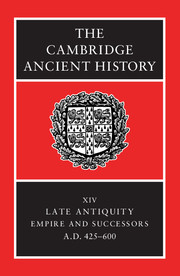Book contents
- Frontmatter
- PART I CHRONOLOGICAL OVERVIEW
- PART II GOVERNMENT AND INSTITUTIONS
- 6 Emperor and court
- 7 Government and administration
- 8 Administration and politics in the cities of the fifth to the mid seventh century: 425–640
- 9 Roman law
- 10 Law in the western kingdoms between the fifth and the seventh century
- 11 The army, c. 420–602
- PART III EAST AND WEST: ECONOMY AND SOCIETY
- PART IV THE PROVINCES AND THE NON-ROMAN WORLD
- PART V RELIGION AND CULTURE
- Conclusion
- Chronological Table
- BIBLIOGRAPHY
- Index
- References
7 - Government and administration
from PART II - GOVERNMENT AND INSTITUTIONS
Published online by Cambridge University Press: 28 March 2008
- Frontmatter
- PART I CHRONOLOGICAL OVERVIEW
- PART II GOVERNMENT AND INSTITUTIONS
- 6 Emperor and court
- 7 Government and administration
- 8 Administration and politics in the cities of the fifth to the mid seventh century: 425–640
- 9 Roman law
- 10 Law in the western kingdoms between the fifth and the seventh century
- 11 The army, c. 420–602
- PART III EAST AND WEST: ECONOMY AND SOCIETY
- PART IV THE PROVINCES AND THE NON-ROMAN WORLD
- PART V RELIGION AND CULTURE
- Conclusion
- Chronological Table
- BIBLIOGRAPHY
- Index
- References
Summary
The late Roman period saw the development, for the first time in the Roman world, of complex bureaucratic structures which permitted emperors, who had now abandoned the campaigning or peripatetic style of most of their predecessors during the first four centuries of imperial history, to retain their authority. The emperor and his court with its glittering ceremonies in Constantinople was the focus for the eastern empire, and from there issued the laws which announced imperial wishes. The armies, though no longer directly commanded by emperors, strove to preserve the frontiers and maintain law and order inside them. But the smooth functioning of this system required administrative structures which had to become more complex and intrusive as the curial élites in individual cities, who had traditionally performed many vital tasks in the areas of revenue generation, dissemination of imperial wishes and preservation of local order, slowly declined in authority or surrendered control of some of these duties; here was a cyclical process, with administrative developments responding to, but also encouraging, a weakening of the curial class. The impact of administration is reflected in a story from the Life of Theodore of Sykeon: devils being exorcized cried out: ‘Oh violence! Why have you come here, you iron-eater, why have you quitted Galatia and come into Gordiane? There was no need for you to cross the frontier. We know you have come, but we shall not obey you as did the demons of Galatia, for we are much tougher than they, and not milder’.
- Type
- Chapter
- Information
- The Cambridge Ancient History , pp. 164 - 206Publisher: Cambridge University PressPrint publication year: 2001
References
- 2
- Cited by

